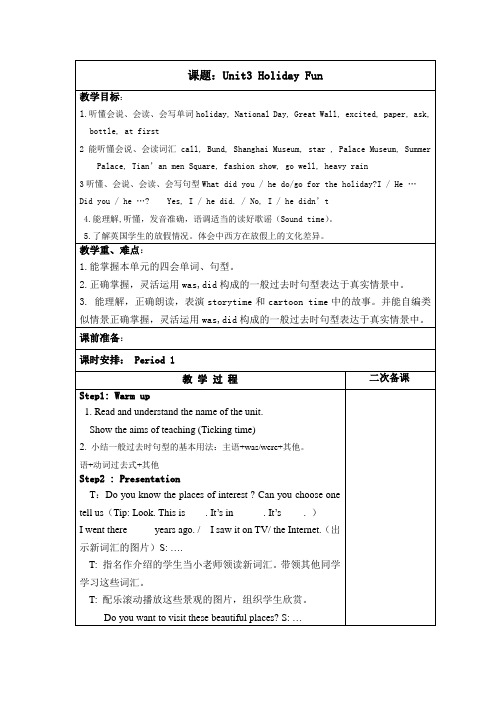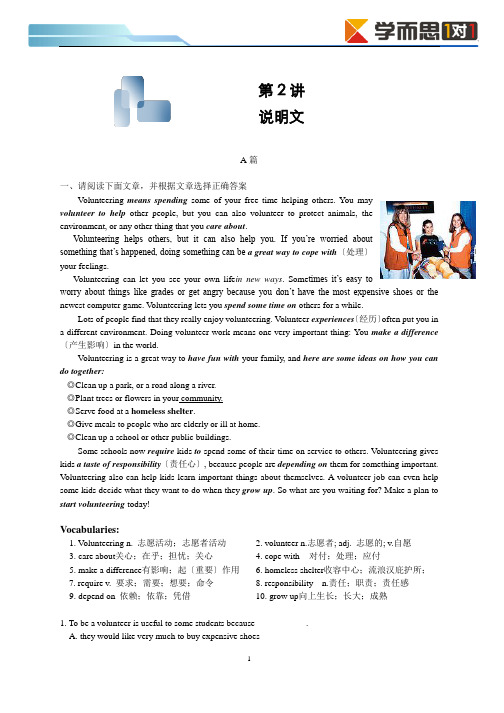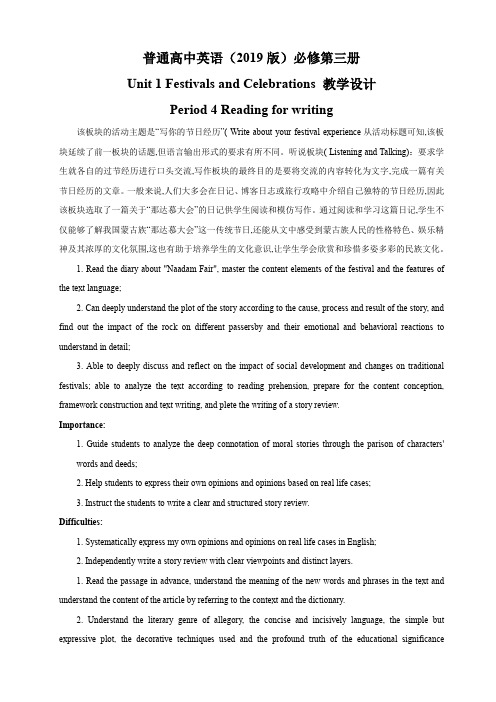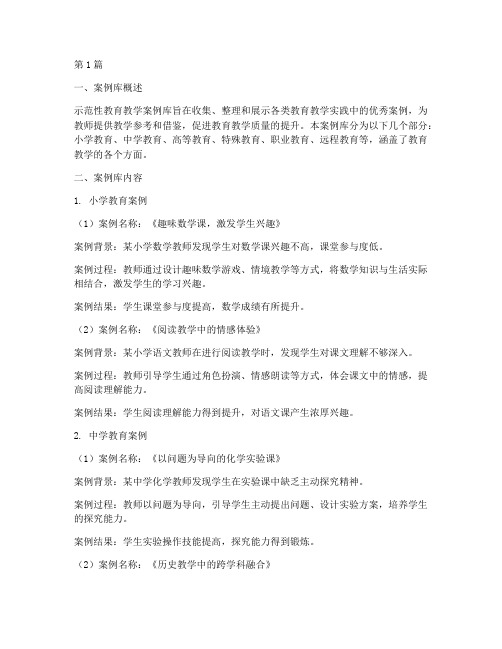The importance of holiday 英语阅读教学设计
holiday教案

S: … T: 引导学生学习 eat 的过去式 ate. 引导学生小结一般过去时一般疑问句的问法和回答。 S:跟录音朗读课文中的相关内容。 Step 3 Practice 1.完整的欣赏课文内容视频,模仿人物的语音语调。尝试配 音。 2. Read the text in different roles in groups. Step 4 Conclusion
1.完成书 P.28 Think and write 和 Ask and answer. 2.请你作为校报记者,采访 Liu Tao 和 Mike 的好朋友。 (小组操练并 汇报) 3. Judge and tick.(Ticking time)
板书设计 Unit 3
When ?
Holiday fun
4.能理解,听懂,发音准确,语调适当的读好歌谣(Sound time) 。 5.了解英国学生的放假情况。体会中西方在放假上的文化差异。
教学重、难点: 1.能掌握本单元的四会单词、句型。 2.正确掌握,灵活运用 was,did 构成的一般过去时句型表达于真实情景中。 3. 能理解,正确朗读,表演 storytime 和 cartoon time 中的故事。并能自编类 似情景正确掌握,灵活运用 was,did 构成的一般过去时句型表达于真实情景中。 课前准备: 课时安排: Period 1 教 学 过 程 Step1: Warm up 1. Read and understand the name of the unit. Show the aims of teaching (Ticking time) 2. 小结一般过去时句型的基本用法:主语+was/were+其他。
语+动词过去式+其他
Step2 : Presentation and practice 1. Show the aims of teaching (Ticking time) 2. T: Mike went to a farm. He had a good time. Do you want to play with him? 播放 Sound time 录音, 让学生注意倾听语音, 语调并跟读。 播放背景音乐,指名学生扮演 Mike,领着大家读一读。 3. T: Did you have a great fun holiday? Our classmates has been to many interesting places. You can ask them and understand. Boys and girls ,please share your wonderful travel experiences with us. What can we ask? S: 复习新句型并在黑板上默写。 4. T: 提问一名学生,了解该生的旅游经历。并根据学生的叙 述提问: Did you ….? 作为范例,组织学生利用新学词 汇,句型相互询问旅游经历。 S: 分组汇报一名成员的旅游经历。 T:组织学生将自己或他人的旅游经历写下来,汇报交流。 ①Look, This is ____. I went there ________(when).I______ (what…do) It’s_____(how) I hope you can go there, too! ②My friend ____ had a great fun holiday. He went to ______. He ______and _____.He was very____. 5. T: We all like holidays. We have two main school holidays:
浅谈UbD理论下的小学英语语篇阅读教学设计——以译林版小学英语六年级上册Unit_3“Holiday

ENGLISH ON CAMPUS2023年16期总第664期浅谈UbD理论下的小学英语语篇阅读教学设计——以译林版小学英语六年级上册Unit 3“Holiday fun”的教学为例摘 要:UbD理论提倡逆向设计,以单元为整体,重构教学设计流程,从而避免传统教学设计“见木不见林”、重活动而轻理解的倾向,更高效地帮助学生理解大概念,提升学生的学科核心素养。
本文概述了UbD理论的基本内涵,分析其应用于小学英语教学设计的优势,并结合具体课例阐释UbD理论下小学英语语篇阅读教学设计思路。
关键词:UbD理论;大概念;核心素养;教学设计作者简介:钱璟星,江苏省南京市潭桥小学。
一、UbD理论的基本内涵UbD理论由学者威金斯与麦克泰提出,主张通过逆向设计帮助学生理解所学内容,即先预设学生的学习结果,再确定相应评估方式,最后设计教学。
该理论的设计模式落地课堂,需要经过以下几个阶段:阶段1,教师结合学情与课程标准,考虑本设计的预期结果,确定学生的理解目标和基本问题,设定单元教学目标;阶段2,教师为达成预期目标设计多种评估方法以收集证据,证明学生已经理解;阶段3,教师列出单元主要的教学活动,安排好分课时的教学内容与活动,进行单课的教学设计。
二、UbD理论应用于小学英语教学设计的优势(一)以终为始:促进“教—学—评”一体化实施在传统的课堂中,教师往往从教者的角度出发,按教科书的编排顺序与逻辑进行教学活动的设计与实施,评价过程往往流于形式。
UbD理论倡导以终为始,从学生的角度出发,先预设理想的学习结果,再设计评估工具,最后设计教学活动,从而避免传统教学中易出现的“活动导向”,时刻保持教学活动不偏移目标,在课程实施方面能够充分落实“教—学—评”一体化,促进学生高效学习。
(二)理解为先:促进学生对英语学科大概念的掌握大概念是学科核心概念,是隐藏在知识背后的底层逻辑与核心思想,可使离散的事实和技能相互联系。
英语大概念一般可分为指向跨学科特点的主题大概念与指向学科本体的语言大概念。
Myholiday小学英语课堂公开课教案

My holiday小学英语课堂公开课教案My holiday小学英语课堂公开课教案(精选5篇)作为一位不辞辛劳的人民教师,时常需要编写教案,借助教案可以有效提升自己的教学能力。
优秀的教案都具备一些什么特点呢?下面是我为大家收集的My holiday小学英语课堂公开课教案,仅供参考,大家一起来看看吧。
My holiday小学英语课堂公开课教案 1一、教学目标:1. 能够听、说、读、写句型:Where did you go on your holiday ? I went to Xinjiang.2.能够在实际情景中正确运用所学对话。
二、教学重点:四会掌握句型:Where did you go on your holiday ? I went to Xinjiang.三、教学难点:能够在实际情景中正确运用所学对话。
四、教具:录音机、录音带、相关图片、地名卡片和单词卡。
五、教学过程:Step 1: Warm-up:1. Greetings2. Listen to the song : A Trip to ChinaStep 2: Revision:1. Game : Good brothers将全班同学分为两大组,教师针对上节课所学的五个动词短语做动作,同学抢说其过去时,反应较慢的'一组同学说出其原形。
2.Ask and answer教师抽取A Let’s learn局部的短语卡片,两组同学轮流问答:A: wha t did you do on your holiday? B: I took pictures/….Step 3: Presentation:1.T: I often go to Songyang Park on the weekend. Do you often go to the park, too?Ss:….T: Where did you go last weekend?Enable the student to answer with “I went to ….”( 板书这两个句型, 让同学理解Where did you go…?并带读。
初中英语阅读第2讲--说明文·教师版

第2讲说明文A篇一、请阅读下面文章,并根据文章选择正确答案V olunteering means spending some of your free time helping others. You mayvolunteer to help other people, but you can also volunteer to protect animals, the environment, or any other thing that you care about.V olunteering helps others, but it can also help you. If you’re worried aboutsomething that’s happened, doing something can be a great way to cope with〔处理〕your feelings.V olunteering can let you see your own life in new ways. Some times it’s easy toworry about things like grades or get angry because you don’t have the most expensive shoes or the newest computer game. V olunteering lets you spend some time on others for a while.Lots of people find that they really enjoy volunteering. V olunteer experiences〔经历〕often put you in a different environment. Doing volunteer work means one very important thing: You make a difference 〔产生影响〕in the world.V olunteering is a great way to have fun with your family, and here are some ideas on how you can do together:◎Clean up a park, or a road along a river.◎Plant trees or flowers in your community.◎Serve food at a homeless shelter.◎Give meals to people who are elderly or ill at home.◎Clean up a school or other public buildings.Some schools now require kids to spend some of their time on service to others. Volunteering gives kids a taste of responsibility〔责任心〕, because people are depending on them for something important. V olunteering also can help kids learn important things about themselves. A volunteer job can even help some kids decide what they want to do when they grow up. So what are you waiting for? Make a plan to start volunteering today!Vocabularies:1. Volunteering n. 志愿活动;志愿者活动2. volunteer n.志愿者; adj. 志愿的; v.自愿3. care about关心;在乎;担忧;关心4. cope with 对付;处理;应付5. make a difference有影响;起〔重要〕作用6. homeless shelter收容中心;流浪汉庇护所;7. require v. 要求;需要;想要;命令8. responsibility n.责任;职责;责任感9. depend on 依赖;依靠;凭借10. grow up向上生长;长大;成熟1. To be a volunteer is useful to some students because ___________.A. they would like very much to buy expensive shoesB. their schools ask them to spend more time serving othersC. it can help them make their own decisions when they are olderD. they can serve food at homeless shelters2. V olunteering can give us a lot so that _______________.A. we needn’t worry about our grades or the environmentB. we can enjoy being served better in different waysC. we have more fun only with our families and friendsD. we should try our best to do more volunteer work3. The reason why students are asked to do some volunteering is that ___.A. students should be more responsible for their school work and social workB. students are too lazy to do any work, inside or outside their schools and homesC. students always depend too much on their schools and familiesD. students are always waiting for the decisions of their parents or schools4.What does the underlined word “community” mean in Chinese?A. 公社B. 公司C. 社区D. 社团Keys: CDAC练习一. 英英释义1) Aunt Mary volunteered to clean up the kitchen.A. offer help willinglyB. wantC. hateD. plan2) I mean to go shopping this afternoon.A. meanB. plan toC. am goingD. mean that I shall3)If you require further information, you should ask the teacher.A. searchB. needC. orderD. enquire4) We put off the conference in order to better cope with the tense situation.A. come up withB. mix withC. deal withD. together with5) The sea air has made a difference to his health.A. damagedB. made a difficulty toC. been different fromD. improvedKeys: ABBCD二. 词性转换1) mean v. 〔mean doing sth.〕意思是,意味着;〔mean to do〕打算______________ n. 意义;含义____________________ adj. 有意义的___________________ adj. 无意义的We fill up our lives with ___________________ tasks.The child read the story but did not comprehend its ___________________.meaningWhat do you ___________________ by opening my letters without permission?meanHe glanced ___________________ at the other policeman, then he went up the stairs."We found no ___________________ differences at all, " she says.Keys: meaningless meaning mean meaningfully meaningful2) experience n. 经验,经历___________________ adj. 老练的,富有经验的___________________ n. 经验者,感受者We should learn from _____________________ teachers.We had never _______________ this kind of holiday before.Keys: experienced experienced3) responsibility n. 责任_________________________ adj. 有责任心的,负责的_________________________ adv.负责的Do you want to be _________________ for your own life decisions?It was his ____________________ for foreign affairs that gained him international prestige.Keys: responsible responsibility三. 选词填空1. Volunteering2. volunteer3. care about4. cope with5.make a difference6. homeless shelter7. require8. responsibility9. depend on 10. grow up1. She would like to volunteer at a ______________________________.2. A little knowledge can______________________________ at a time of death.3. We need to take ______________________________ for looking after our own health4. Do not imagine that you can______________________________ all the problems.5. You can't ______________________________ your parents forever.6. Tom wants to be a coach when he ______________________________.7. She now helps in a local school as a ______________________________ three days a week.8. The young people should ______________________________ the old.9. ______________________________doesn't only improve your life, but also the lives of others10. This ______________________________some time and patience.Key: 1. homeless shelter 2. make a difference 3. responsibility 4. cope with5. depend on6. grows up7. volunteer8. care about9. Volunteering 10. requires四. 句子翻译V olunteering means spending some of your free time helping others._______________________________________________________________________________You make a difference in the world._______________________________________________________________________________Some schools now require kids to spend some of their time on service to others._______________________________________________________________________________五. 语法填空Some schools now require kidsspend some of their time service to others. gives kids a taste of(reponsible) , because people are depending on them for something important. Volunteering also can help kids learn important things about (them). A volunteer job can even help some kids (decision) what they want to do they grow up. So what are you waiting ? Make a plan to start volunteering today!Keys: to on Volunteering responsibility themselves decide when for文章点评:通过向大家展示什么是志愿者,志愿者的工作有哪些,以及志愿者工作能够在许多的方面帮助孩子。
ReadingforWriting教学设计(1)人教版高中英语2

普通高中英语(2019版)必修第三册Unit 1 Festivals and Celebrations 教学设计Period 4 Reading for writing该板块的活动主题是“写你的节日经历”( Write about your festival experience从活动标题可知,该板块延续了前一板块的话题,但语言输出形式的要求有所不同。
听说板块( Listening and Talking):要求学生就各自的过节经历进行口头交流,写作板块的最终目的是要将交流的内容转化为文字,完成一篇有关节日经历的文章。
一般来说,人们大多会在日记、博客日志或旅行攻略中介绍自己独特的节日经历,因此该板块选取了一篇关于“那达慕大会”的日记供学生阅读和模仿写作。
通过阅读和学习这篇日记,学生不仅能够了解我国蒙古族“那达慕大会”这一传统节日,还能从文中感受到蒙古族人民的性格特色、娱乐精神及其浓厚的文化氛围,这也有助于培养学生的文化意识,让学生学会欣赏和珍惜多姿多彩的民族文化。
1. Read the diary about "Naadam Fair", master the content elements of the festival and the features of the text language;2. Can deeply understand the plot of the story according to the cause, process and result of the story, and find out the impact of the rock on different passersby and their emotional and behavioral reactions to understand in detail;3. Able to deeply discuss and reflect on the impact of social development and changes on traditional festivals; able to analyze the text according to reading prehension, prepare for the content conception, framework construction and text writing, and plete the writing of a story review.Importance:1. Guide students to analyze the deep connotation of moral stories through the parison of characters'words and deeds;2. Help students to express their own opinions and opinions based on real life cases;3. Instruct the students to write a clear and structured story review.Difficulties:1. Systematically express my own opinions and opinions on real life cases in English;2. Independently write a story review with clear viewpoints and distinct layers.1. Read the passage in advance, understand the meaning of the new words and phrases in the text and understand the content of the article by referring to the context and the dictionary.2. Understand the literary genre of allegory, the concise and incisively language, the simple but expressive plot, the decorative techniques used and the profound truth of the educational significancerevealed.Step 1 Learning new wordsThe teacher shows the pictures or uses the stick figure to draw the new words or phrases in the teaching text.Step 2 ReadingActivity 11.Students read the diary quickly and answer the first two questions in activity 1.(1)What does "Naadam" mean? Which events does it include?(2)What Naadam Festival customs did you learn about?Suggested Answers:(1) Naadam means"games"in Mongolian,and it includes horse racing,wrestling, and archery.(2) Wrestling and horse racing.2.Students read the diary carefully again with the last two questions from activity 1.After reading thediary, the students share their views in groups. Then the teacher asks some students to answer the questions.(3) What in your opinion is the most impressive thing about the festival?(4) What else would you like to know the festival and writer’s experience?Suggested Answers:(3) The horse racing is the most impressive, as it involved little children.(4) The writer did not talk about food or music, but surely they should have been interesting parts ofthe festival.Activity 21.Teacher asks Ss to study organization and language features.Ss read the sentences and rewrite theopening sentences of the article.2.Read the sentences and rewrite the opening sentences of the article.●This was my first time spending three days experiencing the Naadam Festival in China’s InnerMongolia Autonomous Region and it was an enjoyable and exciting experience for me./I'll never forget my experience at the Naadam Festival because it was my first time to watch the exciting Mongolian games of horse racing, wrestling, and archery so closely./I'll always remember my first experience at the Naadam Festival in China’s Inner Mongolia Autonomous Region because it was because it was anenjoyable and exciting experience for me.Step 3 Analyzing article structureActivity 31.Teachers raise questions to guide students to analyze the chapter structure of this diary and thinkabout how to describe the festival experience.(1)What should be included in the opening/body/closing paragraph(s)?(2)How did the writer arrange his/her ideas?(3)What kind of interesting details did the writer describe?(4)How did the writer describe his/her feelings/emotions during the event?2. Students read and pare the three sentence patterns in activity 2. Try to rewrite the first paragraph ofthe diary with these three sentence patterns. After that, students exchange corrections with their partners.Such as:●This was my first time spending three days experiencing the Naadam Festival in China’s InnerMongolia Autonomous Region and it was an enjoyable and exciting experience.●I'll never forget my experience at the Naadam Festival because it was my first time to watch theexciting Mongolian games of horse racing, wrestling, and archery so closely.●I'll always remember my first experience at the Naadam Festival in China’s Inner MongoliaAutonomous Region because it was so amazing to spend three days witnessing a grand Mongolian ceremony.Step 4 Accumulation of statementsActivity 41.Ask the students to read the diary again. Look for sentences that express feelings and emotions,especially those with the ing form and the past participle.Such as:● …horse racing, wrestling, and archery, which are all so exciting to watch.● some amazing performances● I was surprised to see…● I was a little worried about...● feeling really tiredOther emotional statements:●I absolutely enjoyed the archery, too, but the horse races were my favourite part.●I'm finally back home now, feeling really tired, but celebrating Naadam with my friend was totallyworth it.●He invited me back for the winter to stay in a traditional Mongolian tent and cat hot pot. I can’twait!2.In addition to the use of the ing form and the past participle, the teacher should guide the students inthe appreciation of these statements, ask them to memorize them, and encourage them to use them reasonably in writing practice.Step 5 Writing taskActivity 51.Writing preparation.Students review their recent holiday experiences and list in short phrases all theactivities, events and feelings related to the holiday.2. Draw an outline.Students review the discourse analysis method of Activity 2, and fill in the name,content details and emotional feelings of the festival or celebration in the outline form of Activity 3, and draw up the writing outline of the diary.3. Write a first draft.Then write an opening sentence that introduces the topic and overall feeling of thearticle, a rich body paragraph, and a conclusion summarizing the holiday experience.4. Peer review.Students work in pairs to exchange the first draft, review each other according to the sixpoints in activity 3, and write Suggestions for revision.Students further modify the essay based on feedback from their peers.5. Writing and sharing.Students can share and discuss in groups after finishing the revision, and remendexcellent positions to be displayed or read aloud in class.The teacher ments on the students' work, points out the advantages and suggests the modification.In addition, the teacher can also post the excellent position in the classroom for everyone to appreciate.Step 6 Sharing writingActivity 6T call some Ss to share their writing.Step 7 Homework1. Read the passage in this section to better understand the passage.2. Carefully understand the hierarchical structure of the article, and deeply understand the plot of thestory according to the causes, process and results;3. Independently plete the relevant exercises in the guide plan.1、通过本节内容学习,学生是否理解和掌握阅读文本中的新词汇的意义与用法;2、通过本节内容学习,学生能否掌握日记中关于节日见闻的内容要素及文本语言特点;3、通过本节内容学习,学生能否根据故事的起因、经过和结果来深入理解故事的情节,从而了解文章的层次结构;4、深入探讨和反思社会的发展变化对传统节日的影响,能够根据阅读理解对文本进行分析,从内容构思、框架搭建和文本撰写上做准备,完成一篇有关节日活动经历的记叙文写作。
示范性教育教学案例库(2篇)

第1篇一、案例库概述示范性教育教学案例库旨在收集、整理和展示各类教育教学实践中的优秀案例,为教师提供教学参考和借鉴,促进教育教学质量的提升。
本案例库分为以下几个部分:小学教育、中学教育、高等教育、特殊教育、职业教育、远程教育等,涵盖了教育教学的各个方面。
二、案例库内容1. 小学教育案例(1)案例名称:《趣味数学课,激发学生兴趣》案例背景:某小学数学教师发现学生对数学课兴趣不高,课堂参与度低。
案例过程:教师通过设计趣味数学游戏、情境教学等方式,将数学知识与生活实际相结合,激发学生的学习兴趣。
案例结果:学生课堂参与度提高,数学成绩有所提升。
(2)案例名称:《阅读教学中的情感体验》案例背景:某小学语文教师在进行阅读教学时,发现学生对课文理解不够深入。
案例过程:教师引导学生通过角色扮演、情感朗读等方式,体会课文中的情感,提高阅读理解能力。
案例结果:学生阅读理解能力得到提升,对语文课产生浓厚兴趣。
2. 中学教育案例(1)案例名称:《以问题为导向的化学实验课》案例背景:某中学化学教师发现学生在实验课中缺乏主动探究精神。
案例过程:教师以问题为导向,引导学生主动提出问题、设计实验方案,培养学生的探究能力。
案例结果:学生实验操作技能提高,探究能力得到锻炼。
(2)案例名称:《历史教学中的跨学科融合》案例背景:某中学历史教师希望提高学生对历史课的兴趣。
案例过程:教师将历史知识与地理、政治等学科相结合,开展跨学科教学活动。
案例结果:学生历史知识掌握更加全面,对历史课产生浓厚兴趣。
3. 高等教育案例(1)案例名称:《以学生为中心的大学英语教学》案例背景:某大学英语教师发现学生在课堂上的参与度不高。
案例过程:教师采用以学生为中心的教学方法,鼓励学生积极参与课堂讨论,提高英语口语表达能力。
案例结果:学生英语口语表达能力得到提升,对英语课产生浓厚兴趣。
(2)案例名称:《案例教学法在法学教育中的应用》案例背景:某法学教师希望提高学生的案例分析能力。
Unit-3《-Holiday-fun-》教学设计-优秀教案精选全文

3.学习目标确定
1)复习、巩固前三课时所学单词、句型和日常用语;
2)能正确朗读Sound time中的小诗,体会英语朗读中的降调,并能对语句做出正确的降调解析和朗读;
3)能够理解Checkout time图片内容,并能够正确运用动词过去式;
4)能根据一定语境,运用过去时记录自己的假期生活。
4.学习重点难点
重点:
1)正确朗读Sound time中的小诗,体会英语朗读中的降调;
2)理解Checkout time图片内容,并能够正确运用动词过去式;
3)根据一定语境,运用过去时记录自己的假期生活。
5.学习评价设计
6.学习活动设计
教师活动学生活动
环节一:(根据课堂教与学的程序安排)
在这一学年中,不仅在业务能力上,还是在教育教学上都有了一定的提高。
金无足赤,人无完人,在教学工作中难免有缺陷,例如,课堂语言平缓,语言不够生动,理论知识不
够,教学经验不足,组织教学能力还有待提高。
在今后的工作中,我将更严格要求自己,努力工作,发扬优点,改正缺点。
xx小学英语教案《Holiday》

xx小学英语优秀教案《Holiday》一、教学目标:1. 知识目标:(1)让学生掌握基本的节假日词汇,如:New Year's Day, Easter, Christmas, National Day等。
(2)让学生能够用英语简单描述节日的日期、习俗和活动。
2. 能力目标:(1)培养学生运用英语进行交际的能力,能够询问和介绍节日的相关信息。
(2)培养学生通过图片、资料等方式获取信息的能力。
3. 情感目标:(1)培养学生对不同文化的尊重和理解。
(2)培养学生积极参与课堂活动,提高学习英语的兴趣。
二、教学重难点:1. 教学重点:(1)掌握节假日词汇。
(2)能够用英语描述节日的日期、习俗和活动。
2. 教学难点:(1)正确运用相关语法,如:一般现在时。
(2)如何用英语表达具体的节日习俗和活动。
三、教学方法:1. 情境教学法:通过设定各种节日情境,让学生在实际语境中学习和运用英语。
2. 交际教学法:鼓励学生进行小组讨论和角色扮演,提高学生的英语交际能力。
3. 任务型教学法:通过完成各种任务,让学生在实践中学习和运用英语。
四、教学准备:1. 教师准备:(1)制作多媒体课件,包括节日图片、视频等。
(2)准备相关节日资料,如:习俗、活动等。
2. 学生准备:(1)预习相关节假日词汇。
(2)准备介绍自己喜欢的节日的内容。
五、教学过程:1. 导入:(1)教师通过提问方式引导学生谈论节假日。
(2)学生展示自己喜欢的节日,激发学习兴趣。
2. 呈现:(1)教师展示节日图片,引导学生说出节日名称。
(2)教师介绍节日的日期、习俗和活动。
3. 学习:(1)学生通过小组讨论,总结节日的日期、习俗和活动。
(2)教师引导学生用英语描述节日的日期、习俗和活动。
4. 练习:(1)学生进行角色扮演,模拟介绍节日的场景。
(2)学生完成相关任务,如:制作节日卡片、编写节日小故事等。
5. 总结:(1)教师引导学生总结本节课所学内容。
(2)学生分享学习收获和感受。
- 1、下载文档前请自行甄别文档内容的完整性,平台不提供额外的编辑、内容补充、找答案等附加服务。
- 2、"仅部分预览"的文档,不可在线预览部分如存在完整性等问题,可反馈申请退款(可完整预览的文档不适用该条件!)。
- 3、如文档侵犯您的权益,请联系客服反馈,我们会尽快为您处理(人工客服工作时间:9:00-18:30)。
The importance of taking holidayTeaching material analysis:This reading text is about the importance of taking holidays, which consists five parts: why take holidays, the advantages of taking holidays, what way, where to go and transport. In addition, students are familiar with the structure of this kind of passages and get some language basis in their prior learning. Also three teaching steps: pre-reading, while-reading, post-reading are designed for developing students’ reading strategies. Student analysis:The most of senior high school students are interested in learning English. They have high motivation in English learning and they are positive and confidence in accepting new knowledge. Most of them can understand and change ideas of specific topics in real life situation. Besides, they gradually adapt to learning English in different tasks and activities. However, it is hard for them to completely understand the holistic text meaning and still need the guidance of learning strategies and positive and corrective feedback assisted by teachers.Teaching Objectives:1. Knowledge Objectives:(1) Vocabulary: Most of students are able to recognize, pronounce andget the meaning of words and phrases about taking holidays:exhausted, rejuvenate, spoilt, cancellation, catch up with, end up,burn out, wear out, step back, go off, coach trips, air fares.(2) Functions: students are able to get some sentence patterns andstructures in describing personal experiences: when it comes to…There is no excuse for…(3) Grammar: students are able to grasp the form and function ofgerund and exclamatory sentence: Taking a holiday is just likehaving a sleep;You will go back to work feeling far more relaxed;How important that is.2. Skills Objectives:(1) Most of students are able to get the gist and specific informationthrough the reading strategies: skimming, scanning, referencing,etc.(2) 80% Students are able to describe their personal experiences brieflyusing the words and expressions learned in this passage.(3) Students are able to write their personal holiday experiences inseveral aspects: location, transport, feelings, etc.3. Affect:(1) During learning this passage, students are able to be positive andactive in participating in the group discussion and enhance theirintrinsic motivation in English learning.(2) Also students are able to develop collaborative and team sprits ingroup work.(3) Students are able to know the differences between west and Chinaand share their attitude and life value with others.4. Learning Strategies:(1) Cognitive strategies: guide students to realize the gist of the text and get the specific information of this topic.(2) Resource strategies: guide students to get the meaning of new words by visual aids and dictionary and find more learning material in Internet.5. Cultural awareness(1) Students are able to know the culture meaning of some old saying:“A change is as good as a rest”, “All work and no play makes jack a dull boy”.(2) Students are able to identify the difference of life style and socialvalue between west and China.Teaching strategies:1. Situational teaching method: show some pictures about places wherethe teacher taking a holiday in real situations and ask student torecognize what are pictures showing.2. Task-based teaching method: divided students into several groups todiscuss the question of the advantages and locations of taking aholiday and then make an interview to collect the information ofeach group; ask several students to introduce their experiences andideas in front of class.Teaching modes:PWP: The corn task of pre-reading focus on the activating of students’schema knowledge, task introducing, students motivating, andlanguage and strategies preparation. In while-reading part, studentsare asked to recognize the specific information and to developinference competence and logical thinking. While the post-readingpart attaches more importance to the comprehensive application ofknowledge.Teaching Procedures:Step1 Pre-reading1. Lead-inProvide some pictures of places where the teacher taking a holiday and introduce personal feelings and experiences to draw students’ attention.T: last summer I went to Yellow Mountain to take a holiday because I feel stressful and exhausted sometimes and I want to relax /rejuvenate myself.Then, ask students the following question: what do you usually do to relax /rejuvenate yourself? What places you want to go to take a holiday?( 目的:自然导入本课话题并利用导入部分的图片展示与师生对话将生词词组贯穿其中以便于移除学生阅读词汇障碍。
